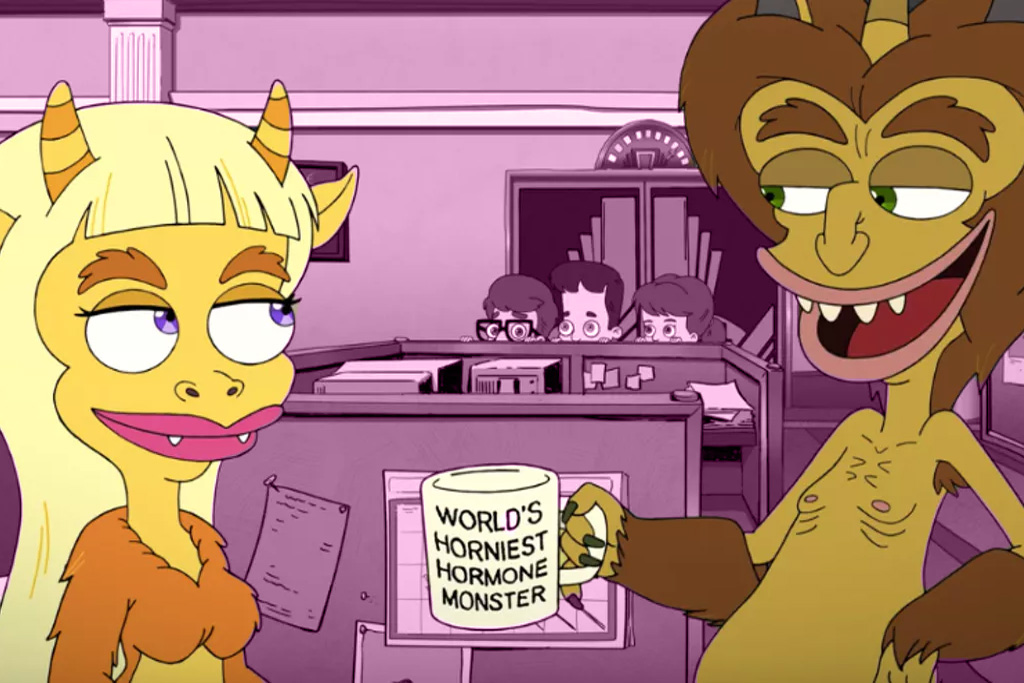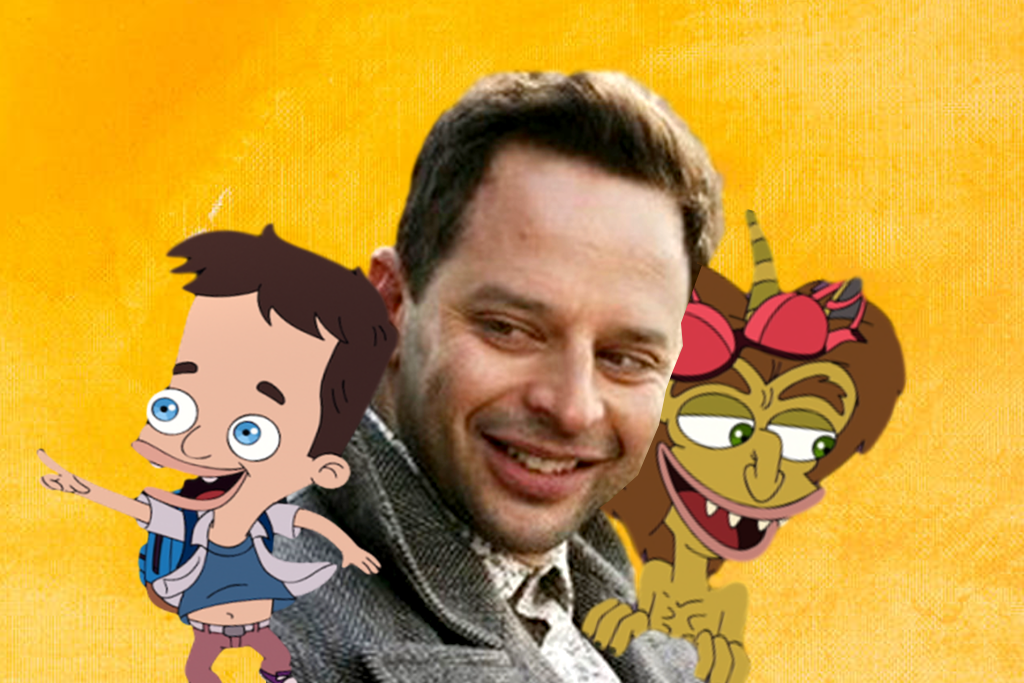‘Big Mouth’ Captures The Distinct Awkwardness Of Queer Puberty
'Big Mouth' is one of Netflix’s oddest achievements.

There’s no doubt that Big Mouth is one of the best shows streaming right now.
You can be forgiven for scrolling past it, put off by its — what can only be described as intentionally hideous art style — but to avoid the show now as it comes into its third season, is nothing short of a grave oversight.
The kind of oversight that conjures the spectral gnawing presence of the Shame Wizard (David Thewlis, also known as the least intimidating Ares of all time).
For the uninitiated, Big Mouth is a surrealistic show which follows the lives of half a dozen young teens as they go through the throes of puberty.
The catch; instead of hormone surges and fluctuating emotions driving them to act out in a variety of increasingly awful (albeit relatable) ways; physical manifestations of their hormones, shame and other aspects of a tormented teens existence are perched on our protagonists’ shoulders, or in the case of the Depression Kitty, curled up on their teens chest, slowly suffocating them.
Big mouth on Netflix is funny af and if you disagree, you’re wrong.
— Kung Fu Henny (@adamatic112) March 10, 2019
It’s a bizarre premise realised in an even more bizarre way, who the hell wants to relive puberty? Of all horrors?
Yet Big Mouth has been able to pull it off, and with the recent release of the show’s first holiday special (My Furry Valentine), there’s a lot to love about this kooky program. Its laugh-out-loud humour, its heart, and particularly, the big topics it decides to explore.
Toxic Masculinity In Cartoons?
Big Mouth while capturing the typical angst and mood swings of puberty pays equal attention to the forms and realities of modern toxic masculinity.
Right from the get go the show posits Nick’s (Nick Kroll) father, Elliot, as the foil of toxic masculinity, normalising Elliot’s emotional vulnerability and affection between him, his family and other men.
The other side of the coin is revealed in ‘My Furry Valentine’ and we see one of the shows main protagonists, Andrew (Andrew Goldberg) the loveable pervert, display increasingly concerning behaviour towards his crush Missy.
Watching Andrew go from awkward but sweet to literally throwing money at Missy and emotionally abusing her in front of their friends, is genuinely tough to watch. Andrew becomes his worst self in ‘My Furry Valentine’, and Big Mouth doesn’t shy away from showing how this relates to the behaviour his father, Marty, has been displaying from episode one.
What was once a running joke has taken a dark turn.
@netflix really made a 5 HOUR long ASMR type video with @bigmouth Hormone Monstress saying "bubblebath" every few seconds…..wow….. pic.twitter.com/vRNh8pHFSp
— Dev 👽 (@psychodev_) March 19, 2019
Not Just About The Boys
In saying this Big Mouth isn’t all just about the boys.
Historically on TV, puberty has really been more about a boy’s experience. From as early as its second episode Big Mouth situates itself as a show that refuses to be one sided. Regardless of gender or sex, puberty affects everyone in different ways, and the ways Big Mouth explores this (sometimes to the tune of R.E.M. with a cover song: ‘Everybody Bleeds’) is unfailingly refreshing.
Through three of the series protagonists, tomboy Jessi (Jessi Klein), nerdy Missy (Jenny Slate) and season two new-comer Gina (Gina Rodriguez), Big Mouth covers an array of topics relating to cis women’s bodies and experiences.
Of particular note are the moments where female sexuality is explored in the sense of masturbation and how cis women experience arousal in different ways to cis men, including through literature/smells and fantasies.
Digging deep into the truths of puberty for young cis girls is further explored in season two, as while Jessi and Missy undergo their own series of body issues, new girl Gina is hyper-sexualised by her male classmates, and slut shamed by her female classmates when she is the first in her year to develop breasts.
An achingly familiar story for many young people, especially young people of colour who are all too often ‘adultified.’
Big mouth is so good! #BubbleBath pic.twitter.com/SrwiOpY7Vl
— Tyler Gibbs (@Coach_Gibby) March 19, 2019
Diversity!
In general, both the voice cast and the characters themselves are diverse.
Big Mouth has a refreshingly strong Jewish presence, characters with varying forms of disabilities and characters from an array of cultural backgrounds populate the school, “going through [their own] changes”.
That being said, I wouldn’t be me if my 5’1 self didn’t try to rugby tackle the big rainbow elephant in the room.
There’s an expectation with a show about puberty to be rather binary. I expected it. I got it.
Coming into Big Mouth, I was generally disappointed by the lack of queer exploration. The third episode of season one, ‘Am I Gay?’ is ultimately the story of Andrew being turned on by Dwayne the Rock Johnson, questioning his sexuality within a very misconstrued binary of gay vs straight, only to confirm his heterosexuality by the end of the episode by kissing Nick.
There’s a Big Mouth Valentine’s Day special on Netflix!!!!!!!!wtf!!!!!!!
— kiki (@nanreiknagorb) February 12, 2019
During season one, Matthew, the only openly gay character doesn’t have much of a personality outside of being confident and mean — the way you’d write a gay character if you’re not gay, or have watched a lot of Will and Grace.
This being said, in a similar way to its explorations of all other aspects of puberty, Big Mouth opens itself up to queerness.
By season two Matthew’s shallow facade is peeled away after an older gay man informs him that “being young, gay and mean is not a personality”. Matthew begins to reflect on his own behaviour revealing how his snarkiness is a defence mechanism brought on from his darker past at his last high school.
From here he tries to be kinder, something met with mixed results.
my brother changed all of our netflix profile pics and he made mine the hormone monster from big mouth.
— gracie marie (@graciebarkey) March 4, 2019
Stereotypes
It is revealed that Matthew’s classmates also see him as a stereotype. They treat him, despite his insistence, as a cliché — being asked to “girl talk” and told he is “not, like, a boy”.
While the average show will not even blink twice at such a stereotype, Big Mouth takes it one step further in its recent Valentines Day special.
Rather than solely focusing on the usual main characters like Nick, Andrew, Missy, and Jessi, ‘My Furry Valentine’ takes its time focusing on Matthew, exploring what it is like to be “the only out kid in the whole school” on a holiday that oftentimes chokes real queer kids with its heterosexual norms.
‘My Furry Valentine’ delves into the feeling many queer kids have around this holiday being alienation, isolation, and having no clue about finding another queer person even just to be friends with.
The special marks the first time we see the Hormone Monster, Maurice (Nick Kroll) with Matthew, an insight usually only afforded to main cast members.
I share a Netflix account with my aunt Shannon. I don't know if her changing my profile's picture to the bitchy gay guy from big mouth is supposed to be taken as an insult…
— Steve Prochniak (@the_proch) March 15, 2019
At odds with the other teens, their relationship is actually rather touching; with Matthew telling us the story of his sexual awakening (and subsequent meeting with Maury a year later) in Big Mouth’s signatory fourth-wall breaking manner.
In this exchange, it is genuinely sweet when the usually rude, crude and vile Maury tells us that he actually likes Matthew “more than the others”.
There’s a hope, at the end of ‘My Furry Valentine’ and Matthew meeting his first “gay out in the wild” come the specials end: that Big Mouth will continue its exploration of Matthew’s character, and hopefully tackle the problems that are more commonly experienced by queer kids while facing down puberty.
Yall know there's a #ValentimesDay special episode of Big Mouth on Netflix right? pic.twitter.com/Ya2xFXzFBR
— Thank You Stan Lee (@ForAllNerds) February 14, 2019
Ultimately, the shows balance of vulgarity and sincere compassion for its teen protagonists is what places Big Mouth above the shock-value humour of some other ‘edgy’ animated shows. Yes, the animation is ugly, and awkward but then, puberty so often is.
Honestly, Big Mouth is one of Netflix’s oddest achievements.
If ‘My Furry Valentine’ is any indication of where the show plans to take season three later this year, then you can guarantee I’ll be there for every funny, filthy minute of it.
Seasons 1 and 2 of Big Mouth are currently streaming on Netflix.
Jes Layton is @AGeekwithaHat, writing, drawing and discussing queer-nerdy things in Melbourne.
